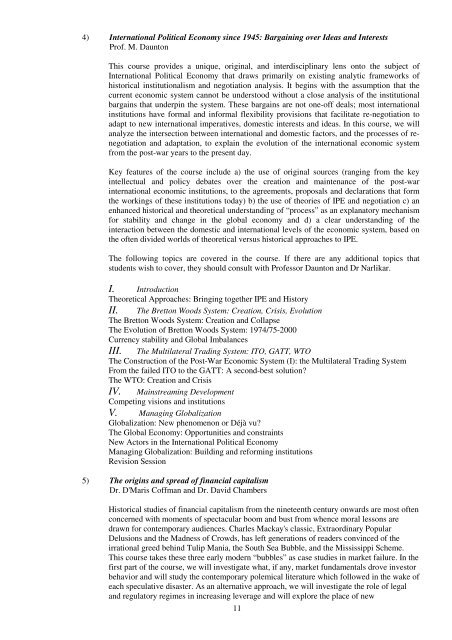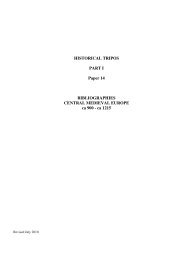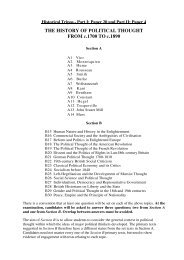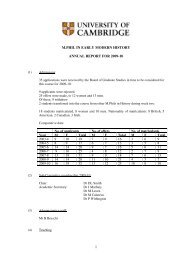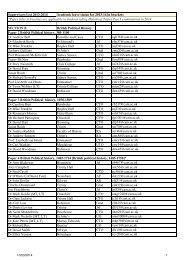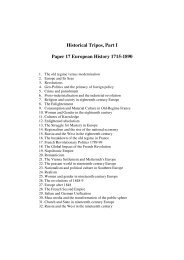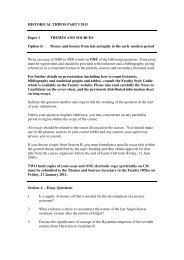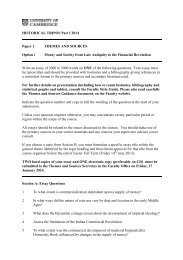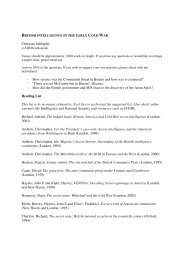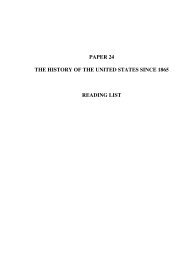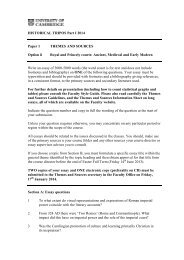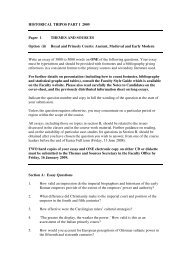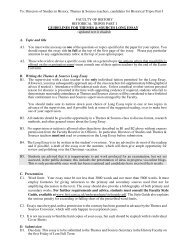Course Handbook - Faculty of History - University of Cambridge
Course Handbook - Faculty of History - University of Cambridge
Course Handbook - Faculty of History - University of Cambridge
Create successful ePaper yourself
Turn your PDF publications into a flip-book with our unique Google optimized e-Paper software.
4) International Political Economy since 1945: Bargaining over Ideas and Interests<br />
Pr<strong>of</strong>. M. Daunton<br />
This course provides a unique, original, and interdisciplinary lens onto the subject <strong>of</strong><br />
International Political Economy that draws primarily on existing analytic frameworks <strong>of</strong><br />
historical institutionalism and negotiation analysis. It begins with the assumption that the<br />
current economic system cannot be understood without a close analysis <strong>of</strong> the institutional<br />
bargains that underpin the system. These bargains are not one-<strong>of</strong>f deals; most international<br />
institutions have formal and informal flexibility provisions that facilitate re-negotiation to<br />
adapt to new international imperatives, domestic interests and ideas. In this course, we will<br />
analyze the intersection between international and domestic factors, and the processes <strong>of</strong> renegotiation<br />
and adaptation, to explain the evolution <strong>of</strong> the international economic system<br />
from the post-war years to the present day.<br />
Key features <strong>of</strong> the course include a) the use <strong>of</strong> original sources (ranging from the key<br />
intellectual and policy debates over the creation and maintenance <strong>of</strong> the post-war<br />
international economic institutions, to the agreements, proposals and declarations that form<br />
the workings <strong>of</strong> these institutions today) b) the use <strong>of</strong> theories <strong>of</strong> IPE and negotiation c) an<br />
enhanced historical and theoretical understanding <strong>of</strong> “process” as an explanatory mechanism<br />
for stability and change in the global economy and d) a clear understanding <strong>of</strong> the<br />
interaction between the domestic and international levels <strong>of</strong> the economic system, based on<br />
the <strong>of</strong>ten divided worlds <strong>of</strong> theoretical versus historical approaches to IPE.<br />
The following topics are covered in the course. If there are any additional topics that<br />
students wish to cover, they should consult with Pr<strong>of</strong>essor Daunton and Dr Narlikar.<br />
I. Introduction<br />
Theoretical Approaches: Bringing together IPE and <strong>History</strong><br />
II. The Bretton Woods System: Creation, Crisis, Evolution<br />
The Bretton Woods System: Creation and Collapse<br />
The Evolution <strong>of</strong> Bretton Woods System: 1974/75-2000<br />
Currency stability and Global Imbalances<br />
III. The Multilateral Trading System: ITO, GATT, WTO<br />
The Construction <strong>of</strong> the Post-War Economic System (I): the Multilateral Trading System<br />
From the failed ITO to the GATT: A second-best solution<br />
The WTO: Creation and Crisis<br />
IV. Mainstreaming Development<br />
Competing visions and institutions<br />
V. Managing Globalization<br />
Globalization: New phenomenon or Déjà vu<br />
The Global Economy: Opportunities and constraints<br />
New Actors in the International Political Economy<br />
Managing Globalization: Building and reforming institutions<br />
Revision Session<br />
5) The origins and spread <strong>of</strong> financial capitalism<br />
Dr. D'Maris C<strong>of</strong>fman and Dr. David Chambers<br />
Historical studies <strong>of</strong> financial capitalism from the nineteenth century onwards are most <strong>of</strong>ten<br />
concerned with moments <strong>of</strong> spectacular boom and bust from whence moral lessons are<br />
drawn for contemporary audiences. Charles Mackay's classic, Extraordinary Popular<br />
Delusions and the Madness <strong>of</strong> Crowds, has left generations <strong>of</strong> readers convinced <strong>of</strong> the<br />
irrational greed behind Tulip Mania, the South Sea Bubble, and the Mississippi Scheme.<br />
This course takes these three early modern “bubbles” as case studies in market failure. In the<br />
first part <strong>of</strong> the course, we will investigate what, if any, market fundamentals drove investor<br />
behavior and will study the contemporary polemical literature which followed in the wake <strong>of</strong><br />
each speculative disaster. As an alternative approach, we will investigate the role <strong>of</strong> legal<br />
and regulatory regimes in increasing leverage and will explore the place <strong>of</strong> new<br />
11


